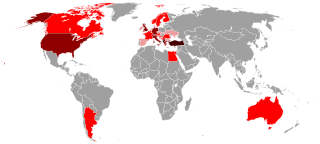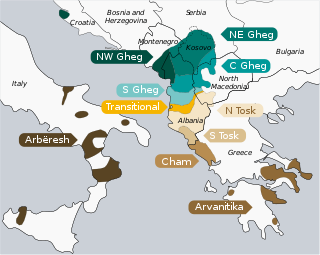
Albania, officially the Republic of Albania, is a country in Southeast Europe. The country is located in the Balkans on the Adriatic and Ionian Seas within the Mediterranean Sea and shares land borders with Montenegro to the northwest, Kosovo to the northeast, North Macedonia to the east and Greece to the south. Spanning an area of 28,748 km2 (11,100 sq mi), it displays a varied range of climatic, geological, hydrological and morphological conditions. The country's landscapes range from rugged snow-capped mountains in the Albanian Alps and the Korab, Skanderbeg, Pindus and Ceraunian Mountains, to fertile lowland plains extending from the coasts of the Adriatic and Ionian seas. Tirana is the capital and largest city in the country, followed by Durrës, Vlorë, and Shkodër.

The Albanians are an ethnic group native to the Balkan Peninsula who share a common Albanian ancestry, culture, history and language. They primarily live in Albania, Kosovo, North Macedonia, Montenegro, Serbia as well as in Croatia, Greece, Italy and Turkey. They also constitute a large diaspora with several communities established across Europe, the Americas and Oceania.

The Kosovo War was an armed conflict in Kosovo that lasted from 28 February 1998 until 11 June 1999. It was fought between the forces of the Federal Republic of Yugoslavia, which controlled Kosovo before the war, and the Kosovo Albanian rebel group known as the Kosovo Liberation Army (KLA). The conflict ended when the North Atlantic Treaty Organization (NATO) intervened by beginning air strikes in March 1999 which resulted in Yugoslav forces withdrawing from Kosovo.

Kosovo, officially the Republic of Kosovo, is a country in Southeast Europe with partial diplomatic recognition. Kosovo lies landlocked in the centre of the Balkans, bordered by Serbia to the north and east, North Macedonia to the southeast, Albania to the southwest, and Montenegro to the west. Most of central Kosovo is dominated by the vast plains and fields of Metohija and the Kosovo field. The Accursed Mountains and Šar Mountains rise in the southwest and southeast, respectively. Its capital and largest city is Pristina.
Counties, also sometimes known as prefectures, are the first-level administrative subdivisions of Albania, replacing the earlier districts. Since 2000, there have been 12 counties. Since 2015, they have been divided into 61 municipalities and 373 communes.

Vlorë is the third most populous city of the Republic of Albania and seat of Vlorë County and Vlorë Municipality. Located in southwestern Albania, Vlorë sprawls on the Bay of Vlorë and is surrounded by the foothills of the Ceraunian Mountains along the Albanian Adriatic and Ionian Sea Coasts. It experiences a Mediterranean climate, which is affected by the Ceraunian Mountains and the proximity to the Mediterranean Sea.

The Albania national football team represents Albania in men's international football, and is governed by the Albanian Football Association, the governing body for football in Albania.
Television in Albania was first introduced in 1960. RTSH dominated the Albanian broadcasting field up to the mid-1990s, a period when privately owned radio and TV stations started to occupy the vast empty Albanian frequencies.

The Kategoria Superiore, officially known as Abissnet Superiore for sponsorship reasons, is a professional league for men's association football clubs. At the top of the Albanian football league system, it is the country's primary football competition. It is contested by 10 clubs, and operates on a system of promotion and relegation with the Kategoria e Parë. Seasons run from August to May, with teams playing 36 matches each.
Albanian mafia or Albanian organized crime are the general terms used for criminal organizations based in Albania or composed of ethnic Albanians. Albanian organized crime is active in Europe, North America, South America, and various other parts of the world including the Middle East and Asia. The Albanian Mafia participates in a diverse range of criminal enterprises including trafficking in drugs, arms, and humans. Thanks to their close ties with the 'Ndrangheta of Calabria, they control a large part of the billion dollar wholesale cocaine market in Europe and appear to be the primary distributors of cocaine in various European drug hubs including London. Albanian organized crime is characterized by diversified criminal enterprises which, in their complexity, demonstrate a very high criminal capacity. In Albania, there are over 15 mafia families that control organized crime. According to some sources, Albania is the first European narco state.

The Albanian passport is a travel document issued by the Ministry of Interior to Albanian citizens to enable them to travel abroad. They are also used as proof of identity within the country, along with the Albanian ID card.

The following outline is provided as an overview of and topical guide to Albania:

Albanian is an Indo-European language, and the sole member of an independent branch of that language family. It is the descendant of a Paleo-Balkan language. Standard Albanian is the official language of Albania and Kosovo, and a co-official language in North Macedonia and Montenegro, as well as a recognized minority language of Italy, Croatia, Romania and Serbia. It is also spoken in Greece and by the Albanian diaspora, which is generally concentrated in the Americas, Europe and Oceania. With perhaps as many as 7.5 million speakers, it comprises an independent branch within the Indo-European languages and is not closely related to any other modern language.
Dafina Zeqiri, also known mononymously as Dafina, is a Swedish-born Kosovo-Albanian singer.

Shkodër, historically known as Scodra or Scutari, is the fifth-most-populous city of the Republic of Albania and the seat of Shkodër County and Shkodër Municipality. Shkodra has been continuously inhabited since the Early Bronze Age, and it has roughly 2,200 years of recorded history. The city sprawls across the Plain of Mbishkodra between the southern part of Lake Shkodër and the foothills of the Albanian Alps on the banks of Buna, Drin and Kir. Due to its proximity to the Adriatic Sea, Shkodër is affected by a seasonal Mediterranean climate with continental influences.












